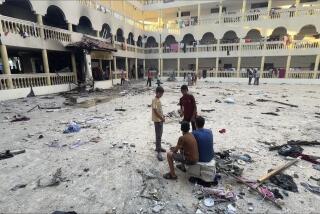U.S. Teams Rush to Evacuate 125 Shelling Victims
- Share via
VIENNA — American medical teams swept into Sarajevo on Sunday to help evacuate civilians injured when a powerful mortar shell smashed into a crowded marketplace, killing 68 people.
As the international community debated how to respond to Saturday’s attack, the bloodiest since Bosnia-Herzegovina’s civil war began, three U.S. military cargo planes and an International Red Cross IL-76 jet ferried victims to safety and treatment in Germany and Italy.
By day’s end, more than 125 people had been evacuated, including some wounded and sick who had been waiting for months for a chance to leave for outside hospitals.
Kris Janowski of the Office of the U.N. High Commissioner for Refugees said the overwhelming response “was proportionate to the barbarity of what happened.”
“Everyone in Sarajevo was moved by the speed of the response,” Janowski said. “It’s hard to come up with a scale of outrage. But (the attack) was at the top of the scale of outrage.”
The evacuations followed the firing of a 120-millimeter shell into a marketplace jammed with shoppers lured outside during good weather to replenish their meager provisions. The attack left more than 200 wounded.
The outpouring of anger and grief continued Sunday as families and friends of the dead streamed to the marketplace to weep and lay flowers at the bloodstained site.
U.N. officials examined the crater but failed to pinpoint which of Bosnia’s warring parties was responsible for the attack. The Muslim-led government blamed the Bosnian Serb artillery gunners surrounding the city. The Serbs denied the charge.
“The crater analysis has been done, and we’ve got nothing more to say on that right now,” said Matthew Nerzig, a U.N. spokesman. Although Nerzig said U.N. experts had been able to determine that the shell was fired from north to northeast of the market, “if we were able to pinpoint (its origin) we would do so.”
On Sunday, the United Nations’ top civilian official for the former Yugoslav federation, Yasushi Akashi, arrived in Sarajevo on a mission to negotiate a truce. He met with Bosnian Serb leader Radovan Karadzic and Bosnia’s Muslim president, Alija Izetbegovic, but could not reach an agreement on a cease-fire and the monitoring of weapons around Sarajevo.
Akashi said an emergency meeting of the Security Council may be held in the next two days. Peace talks among Bosnia’s warring Muslims, Serbs and Croats are scheduled to resume Thursday in Geneva.
Meanwhile, the international community scrambled to find an appropriate response to the scenes of tragedy and gore.
U.N. Secretary General Boutros Boutros-Ghali asked the North Atlantic Treaty Organization to approve air strikes on artillery positions around Sarajevo, a senior U.N. official said late Sunday.
Belgian, French, Turkish and Italian leaders were among those who had earlier voiced support for the strikes.
But others said peace cannot be imposed militarily on the former Yugoslav republic.
British Foreign Secretary Douglas Hurd warned that a retaliatory air strike may yield “simply one day of satisfaction . . . followed not by the lifting of the siege but by its intensification.”
European Union peace envoy Lord Owen spoke out against air strikes for fear the United Nations would then be drawn into the war.
Meanwhile, humanitarian organizations were able to use the media attention directed at Sarajevo to assist some of those suffering. Western governments and international aid agencies, moved by the grisly scenes on television screens, were able to cut through the red tape that has impeded previous evacuations.
This operation, said Ron Redmond, a spokesman for the U.N. refugee agency, moved at “the speed of light.”
Many of the evacuees were headed for the U.S. air base at Ramstein, Germany, and treatment at a nearby medical center in Landstuhl.
Others were taken to medical facilities in Italy.
More to Read
Sign up for Essential California
The most important California stories and recommendations in your inbox every morning.
You may occasionally receive promotional content from the Los Angeles Times.












